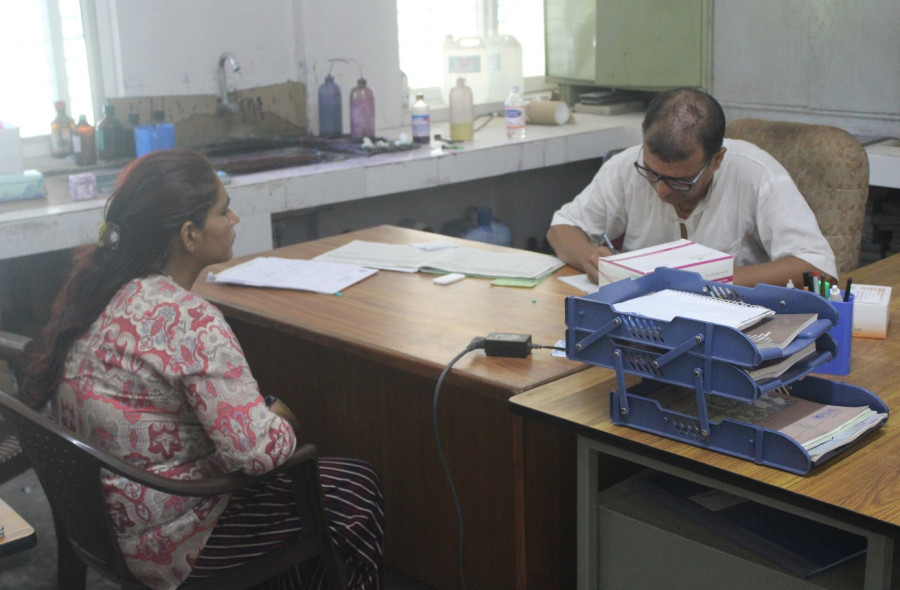Health
Indigenous dengue cases reported in Kathmandu Valley, over a dozen people infected
Doctors urge people to visit health facilities if symptoms occur.
Arjun Poudel
Over a dozen people in Kathmandu Valley have been infected with dengue virus over a week, according to the Epidemiology and Disease Control Division.
The division, which is responsible for containing the spread of the deadly virus, said that several dengue cases have been reported in Kapurdhara, Baneshwor, Tinkune, Tahachal, Teku, Sanobharyang, Balaju, Swayambhu, Lagan and Ason areas.
“More people might have been infected with the virus, as all hospitals, which have been treating patients do share information with us,” Dr Bibek Kumar Lal, director at the division, told the Post. “Several private as well as government hospitals have reported us about the dengue cases.”
Health officials said that all the cases reported in the Valley are indigenous, as the patients do not have a history of travelling to the areas affected by dengue virus in a week.
If the patients do not have a history of travelling to dengue-affected areas for the last one week and get infected with the deadly virus, doctors call it an indigenous case. The incubation period of the dengue virus is one week, which means when dengue infected mosquito bites a healthy person, symptoms surface within one week.
With the rise in the number of indigenous dengue cases, the division on Sunday held an emergency meeting with representatives of Provincial Health Directorate of Province 3 and Provincial Health Offices of all three districts in the Kathmandu Valley—Kathmandu, Lalitpur and Bhaktapur—and discussed immediate measures to contain further spread of the disease.
“We have decided to call a meeting of all local levels and launch an awareness drive and take other measures to prevent the outbreak in the Valley,” said Lal. “Kathmandu Valley is densely populated and there are challenges when it comes to containing the spread of the disease.”
A source at Sukraraj Tropical and Infectious Disease Hospital in Teku said that a health assistant serving at the hospital too has been infected with dengue virus.
Several dengue infected patients have been receiving treatment at the hospital. Doctors say if the dengue transmitting mosquito bites the infected people, it can easily transmit the virus to other people.
Earlier, two health experts from the World Health Organization, who visited the Capital three weeks ago, warned the agency concerned under the Health Ministry about the possible outbreak of the deadly disease.
Those experts, who visited several places of the Kathmandu Valley, had found a huge number of eggs, larvae and pupae of Aedes aegypti and Aedes albopictus mosquitoes, which transmit dengue virus.
The experts were called by the WHO’s country office in Nepal at the request of the Ministry of Health and Population.
Several studies carried out in the past had also found the presence of dengue-carrying mosquitoes in significant numbers in the Valley.
“People in Kathmandu Valley are highly vulnerable to the dengue infection as, vectors are already present there, infected people are going there for treatment and mobility of people to the disease hit areas are also high,” Shishir Panta, an entomologist, who carried out a study on the presence of dengue transmitting mosquitoes in the past, told the Post, “The Valley also provides a suitable environment for the mosquitoes to survive.”
Dengue-transmitting mosquitoes breed in clean water and bite people in daylight. Due to an acute drinking water crisis, people in the Valley collect water in various types of containers and keep until they are used. Uncovered water tanks and discarded plastic cups and bottles could become a breeding ground for dengue-carrying mosquitoes.
Health experts say detection of dengue infection cases from various parts of the Valley are alarming, as massive outbreak can happen at any time.
“The trend of hoarding drinking water in the Valley is dangerous as it provides the dengue spreading mosquitoes a perfect breeding ground, “added Panta.
Dengue is a mosquito-borne viral disease, which is transmitted by the female Aedes aegypti and Aedes albopictus mosquitoes. The same vector also transmits chikungunya, yellow fever, and Zika virus, according to the World Health Organization.
According to doctors, mild to high fever, severe muscle pain, rashes, severe headache, and pain in eyes are some of the symptoms of dengue.
The UN health agency says there is no specific treatment for severe dengue, but early detection and access to proper medical care can lower the fatality rate.
According to the division, as many as 3,425 people have been infected with dengue virus in the fiscal year 2018-019—the highest number of infections in 15 years. Among them, 3,152 were from Province 1, with 3,025 cases reported from Sunsari district alone.
Read:
Pokhara at high risk of dengue outbreak, a new entomological study shows




 13.12°C Kathmandu
13.12°C Kathmandu















